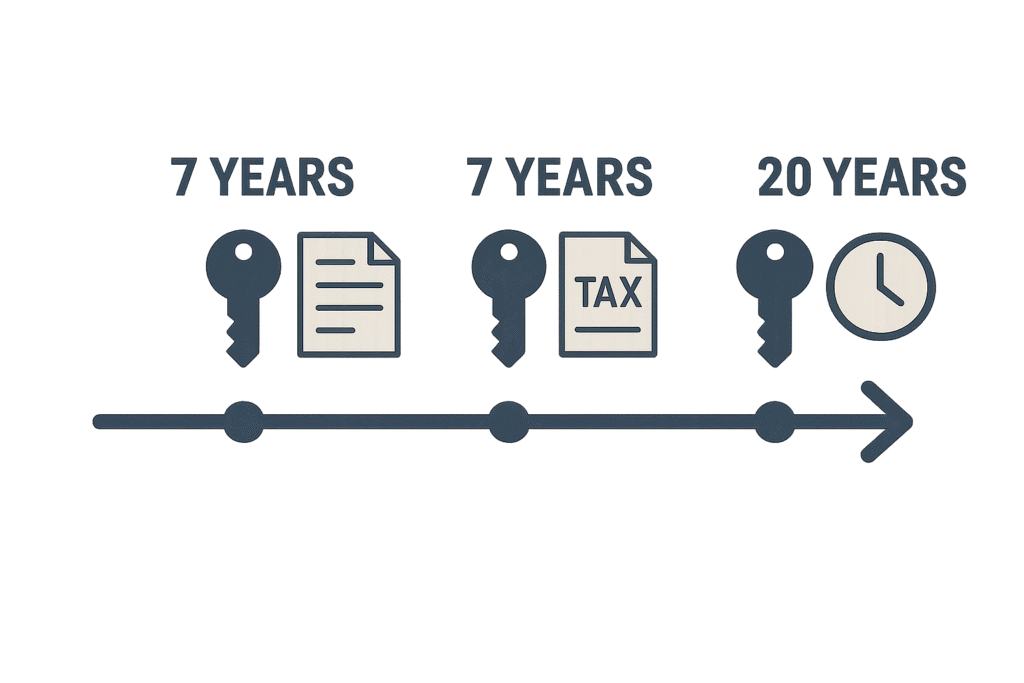How to Clear Title Defects in Georgia Real Estate
Clearing Title Defects In Georgia: A Comprehensive Guide After two decades of handling real estate transactions across Georgia, I’ve seen firsthand how a seemingly minor…

Clearing Title Defects In Georgia: A Comprehensive Guide
After two decades of handling real estate transactions across Georgia, I’ve seen firsthand how a seemingly minor title defect can derail a property sale. A striking example involved a family who, just days before closing, discovered their dream home had an unresolved property lien from a contractor’s work fifteen years earlier. The seller didn’t know the lien existed, and the buyers were understandably worried.
That experience taught me: understanding title defects isn’t just legal terminology. It’s a crucial step for protecting what might be your largest investment. This guide focuses on clearing title defects that Georgia property owners and buyers often encounter.
Understanding Title Defects and the Need for a Clear Title
Think of a title defect as any cloud hanging over your property ownership. It represents a problem in the legal ownership of a property that prevents the current owner from having full, undisputed property rights to the real property.
These defects appear in public records, within the property’s ownership history, or sometimes due to physical aspects of the piece of land itself. They can range from simple clerical errors to complex, long-standing legal disputes.

Marketable Title and Clear Title: The Gold Standard
When real estate agent and licensed attorney professionals discuss “marketable title” or “clear title,” they are referring to the highest standard of property ownership. A marketable title means the property’s title is free from reasonable doubt. It’s the kind of title a sensible buyer would accept without fear of future legal challenges.
A clear title is closely related to this legal concept. It means the property ownership is free from security interests, disputes, or other title defects that would give someone else a legitimate claim to your property. In the state of Georgia, having a marketable title is generally required for real estate transactions to be finalized.
Why Title Defects Lead to Financial Loss and Legal Action
I’ve witnessed buyers lose earnest money deposits because title defects couldn’t be resolved quickly. I’ve also seen sellers forced to lower their price to cover the cost of clearing title defects Georgia requires. The financial loss can be significant for all parties.
Beyond the immediate financial hit, title defects frequently trigger legal action. Someone with a security interest in your property—like a lienholder, a previous owners claiming rights, or a neighbor disputing boundary lines—can file suit to protect their interests. These legal proceeding are rarely quick or cheap. Even if you’re the rightful owner of land, defending your property rights can cost thousands in legal services and consume months of your time.
Common Title Issues and Defects in Georgia
A thorough title examination is the first thing to uncover the title issues property owners face. These issues often fall into three main categories: problems with the transfer record, financial claims, and disputes over the land itself.
Defects Affecting the Chain of Title
The chain of title is the historical sequence showing how property ownership passed from one owner to the next. Any break in this sequence creates a title defect.
| Error Type | Description | Impact on Title |
|---|---|---|
| Misspelled Names | Incorrect spelling of owner names | Breaks chain of title |
| Incorrect Legal Descriptions | Wrong lot numbers or boundaries | Delays closing; requires curative work |
| Improper Notarization | Missing witnesses or notary seals | Invalidates deed under Georgia law |
| Unrecorded Documents | Deeds not filed in county records | Creates gaps in ownership history |
Forgery and Errors in Property Deeds
Forgery, while uncommon, does happen. More frequently, however, I see honest mistakes creating a faulty deed or defect. These errors include:
- Misspelled names or incorrect legal descriptions.
- Property deeds not properly notarized or witnessed according to Georgia law.
- Signatures missing from required parties.
- Types of documents not properly recorded in the county records.
I remember one closing where the legal description had the wrong lot number—off by just one digit. That small error required additional curative work and delayed the closing by three weeks.
Unresolved Estate Issues and Missing Previous Owners
Estate-related title issues are particularly challenging in Georgia. When a property owner dies, their real property passes to heirs. Title defects arise when estates aren’t properly probated, when heirs cannot be located, or when a person inherits property but never formally takes legal title.
I once worked on a deal where the seller’s grandfather died without a will in 1987. The family continued living there and paying taxes, but the legal title never formally passed. Before the sale, we needed to identify all potential heirs (some had moved out of state) and obtain a quitclaim deed from each one.
Financial and Legal Claims Against the Property
A property lien is a legal claim against real estate that secures payment of a debt. These encumbrances attach to the property itself.
Property Liens, Security Deeds, and Unreleased Interests
The most common security interests creating defects are:
| Lien Type | Source | Common Resolution |
|---|---|---|
| Mortgage Liens | Security deeds in Georgia | Obtain lender release |
| Mechanic’s Liens | Unpaid contractors | Pay debt or file satisfaction |
| Judgment Liens | Court judgments | Satisfy judgment and record release |
| Tax Liens | Unpaid property taxes | Pay taxes; wait for redemption period |
The title issues occur when these liens are not correctly released after the debt is paid. I’ve encountered satisfied mortgages from decades ago still showing on the property’s title because the lender never filed the cancellation. Finding that original security interest holder can be a difficult task.
Tax Sale Deeds
Georgia law has specific procedures for tax sale when property ownership is at risk due to unpaid taxes. Tax sale deeds are problematic because the original owner has a right of redemption: a specific period of time to reclaim the property by paying the back taxes plus interest. Until that redemption period of time expires, the original owner’s property rights are not fully extinguished. Any procedural defect in the tax sale process can invalidate the entire transaction in a Georgia court.
Disputes Related to the Piece of Land
Boundary Line Disputes
Boundary line disputes are some of the most emotionally charged title defects. These border disputes often stem from neighbors who’ve built fences or structures based on incorrect assumptions about property lines.
A professional survey sometimes reveals that a driveway or garage corner encroaches onto a neighbor’s piece of land. These situations usually require a legal method like a boundary line agreement or more formal legal action.
Adverse Possession Claim and Prescriptive Title
Adverse possession is a legal principle under Georgia law. Under this principle, someone can gain ownership of land by possessing it openly and continuously for a required length of time. This is essentially a way to resolve long-standing, ambiguous ownership situations.
For an adverse possession claim to succeed in Georgia, the adverse possessor must prove their possession was:
- Actual: They physically occupied or used the land.
- Open and notorious: Their use was visible.
- Hostile: Without the owner’s permission.
- Continuous: For the statutory length of time.
If the adverse possessor has color of title (some document suggesting ownership), the time is seven years. Without color of title, it’s twenty years. These claims create title defects because they grant someone else legally enforceable property rights in your land.

The Initial Curing Phase: Discovery and Non-Judicial Remedies
Clearing title defects Georgia involves a two-step approach: first, non-judicial “curative work,” and second, court action if necessary.
Due Diligence: The Thorough Title Examination Process
The first thing a competent closing attorney or title company does is order a title search.
The Importance of the Title Search and Title Abstracts
The title search is an examination of public records tracing the property’s ownership history back, typically for at least 50 years in Georgia. The title examiner reviews property deeds, mortgages, liens, and court judgments.
Title abstracts are summaries of this research. They provide a chronological overview of every document affecting the property, showing how ownership transferred over period of time and what encumbrances exist. I emphasize to my team that the devil truly is in the details of these abstracts.
Reviewing the Initial Title Report
After the search, the title company issues a title report (or title commitment). This document is the roadmap for the transaction. I always tell my clients to review the section listing exceptions to coverage. These exceptions list existing problems such as easements, restrictive covenants, liens, or other title defects that will remain after closing unless resolved.
Some exceptions, like utility easements, are standard. Others, such as an unreleased mortgage from a previous owners, must be cleared before the transaction can proceed.
Curative Work: Fixing Breaks Non-Judicially
Many title defects can be cured without a trip to the Georgia court.
Using Quitclaim Deed and Warranty Deed to Correct Faulty Deed Issues
When a title defect is a break in the chain of title caused by a faulty deed, corrective deeds provide a solution.
- A quitclaim deed transfers whatever interest the grantor has without making promises about that interest. These are perfect for fixing errors like a misspelled name or missing signature from an old transfer.
- A warranty deed includes promises that the grantor has good title. While less common for pure curative work, it offers stronger protection where the grantor is confident in their legal title.
Obtaining a Release from a Security Interest Holder
If an old mortgage or property lien appears on the title report but should have been released years ago, the process involves tracking down the security interest holder. This requires patience and persistence. You must:
- Locate the current owner of the security interest.
- Provide proof the underlying debt was satisfied.
- Request a formal cancellation or satisfaction document.
- Record the release in public records.
I once spent six weeks tracking down a lender that had been acquired three times since the original mortgage was issued. Locating them and providing detailed proof of payment was necessary to clear the title defect and proceed to closing.
The Role of Real Estate Professionals
The Closing Attorney’s Responsibilities in Real Estate Transactions
In Georgia, licensed attorney typically handle closings. The closing attorney does more than just oversee the signing. Their responsibilities include:
- Examining the property’s title and identifying title defects.
- Coordinating with the title company and lenders.
- Ensuring all legal requirements are met.
- Leading the curative effort when problems surface.
When to Consult an Experienced Real Estate Attorney
Not every transaction needs specialized legal advice beyond the closing attorney. However, certain situations demand consulting an experienced real estate attorney early on. Seek legal services when:
- Complex title defects appear that can’t be resolved with simple documents.
- Boundary line disputes or adverse possession claim exist.
- Tax sale issues or default risks affect the property.
- Multiple parties have a legitimate claim to property ownership.
An attorney can review the title report and develop a strategy before you’re deep into a contract. This due diligence is a smart investment in protecting your property rights.
The Judicial Path: The Georgia Quiet Title Action
When non-judicial efforts to resolve title issues fail, or when property ownership is genuinely disputed, Georgia law provides a powerful legal proceeding known as a conventional quiet title action.
What is a Conventional Quiet Title Action?
A conventional quiet title action is a legal method that asks a Georgia court to examine all claims to a property and issue a judgment declaring who holds legal title. The court effectively ” quiets ” or eliminates the competing claims and ensures a clear title.
This legal action is an equity case, meaning the court has broad discretion to rule in a way that is fair and just. I’ve filed these actions when previous owners died without a will decades ago and locating all heirs proved impossible. The goal is judicial confirmation of property ownership.
Filing Against the World
A quiet title action can be filed “against the world,” meaning the court’s judgment binds everyone, even those who didn’t participate in the lawsuit. This legal authority exists because requiring the filing party to identify every possible future claimant would make clearing title defects in Georgia nearly impossible. The state of Georgia allows this when:
- There’s a cloud on legal title that impairs marketability.
- Competing claims to property ownership exist.
- The chain of title has breaks that resist non-judicial repair.
Navigating the Georgia Court Process
Legal Requirements and Due Diligence
The filing party must precisely describe the property, explain their interest, identify known adverse claimants, and follow strict rules for service of process. Known claimants must be notified personally. Unknown claimants are notified through publication in public records.
Due diligence is key. The Georgia court expects plaintiffs to make reasonable efforts to identify and notify anyone with a legitimate claim. Failing to do so can make the final judgment vulnerable to later challenges.
The Role of a Special Master
In complex quiet title actions, a Georgia court may appoint a special master—an attorney or other qualified person—to investigate the title issues. The special master examines the legal history, reviews the title abstracts, and prepares a report with findings and recommendations for the judge. Their report is highly valued by the court.
Establishing the Legal Title and Ownership Rights
Proving Good Faith and Legal History
The filing party must prove they are acting in good faith and have a legitimate basis for their claim. This involves presenting the property’s legal history clearly and convincingly. Essential documentary evidence includes:
- Recorded property deeds showing the chain of title.
- Surveys establishing property lines.
- Affidavits from previous owners or witnesses.
- A comprehensive title report or abstract.
Satisfying the Burden of Proof
Like all civil cases in Georgia, quiet title actions use a “preponderance of the evidence” standard. This means the filing party must prove their case is more likely true than not. The burden of proof rests on the party seeking to change the status quo. To succeed, you need convincing documentation, credible witnesses, and a coherent legal theory.
Special Title Defect Considerations in the State of Georgia
Addressing Adverse Possession and Color of Title
Adverse Possessor vs. Presumed Owner
The legal principle of adverse possessor versus presumed owner creates unique title challenges. The presumed owner is the person listed on public records. The adverse possessor is the person claiming ownership rights based on long-term, non-permissive use of the piece of land. The court must balance the property rights flowing from recorded title with the fact that ignoring someone’s open possession for decades should not be rewarded.
Understanding the Necessary Length of Time Requirements
Georgia law sets three primary time periods for a successful adverse possession claim:
| Scenario | Time Period | Key Requirement |
|---|---|---|
| With Color of Title | 7 Years | Document suggesting ownership |
| With Tax Payments | 7 Years | Continuous possession + tax payments |
| Without Color of Title | 20 Years | Continuous, open, hostile possession |
The possession must be continuous. Any interruption by the current owner resets the clock.
Clearing Tax Sale Defects and Right of Redemption
The Equity Case for Removing Tax Deeds
Georgia courts, using their equitable powers in an equity case, will sometimes set aside a tax sale if the process was fundamentally unfair or procedurally flawed. This creates an opportunity for clearing title defects Georgia courts must review. Grounds for challenging a tax sale include inadequate notice to the property ownership or errors in the legal description.
Legal Authority Required for the Current Owner
When property is acquired through a tax sale, the current owner (the tax sale purchaser) needs clear legal authority to establish their ownership rights. A tax deed alone is often insufficient, especially if the redemption period of time has not fully expired or if procedural questions exist. A quiet title action is frequently necessary to establish clear title after a tax sale, especially if the previous owners contest the sale.
Conclusion: Securing Your Real Property Investment
Preventing title defects is far easier than curing them. Business owners and individual buyers should take proactive steps to protect their real property investment.
Proactive Steps to Prevent Future Title Defects
I recommend the following due diligence steps:
- Get a survey. A current survey by a licensed surveyor identifies encroachments and boundary line disputes before they become costly legal action.
- Maintain proper records. Keep copies of your deed, title insurance policy, and all documents affecting your property.
- Pay attention to title insurance exceptions. Read the exceptions listed in your title report carefully and address any problematic ones.
- Record important documents promptly. If you obtain a release of lien, record it immediately in the public records.
- Address problems quickly. If a neighbor disputes a property line, don’t ignore it. These title disputes worsen over time.
The Value of Continuous Legal Services and Due Diligence
Real estate law is not a one-time concern. Your property’s title can be affected long after you purchase it. Maintaining a relationship with an experienced real estate attorney provides peace of mind and readily available legal advice.
Your due diligence shouldn’t end at closing. Periodically reviewing your property tax statements and monitoring recorded documents in your county can help catch problems early. If you’re a business owners holding real property, periodic title abstracts or examinations make sense.
Protecting your investment through proper legal services is not an expense; it’s protection against a far larger potential financial loss. Whether you’re buying your first home or dealing with inherited real estate matters, understanding and clearing title defects Georgia is the path to securing your property ownership. Your real property deserves a clear title backed by proper legal authority.





